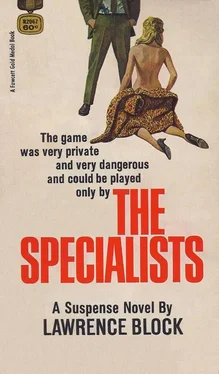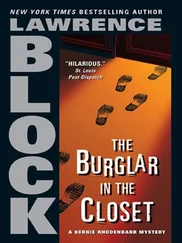The colonel nodded. His legs twinged, and he massaged the stumps again with his hands. He closed his eyes for a moment, absorbed in the pain, and considered the possibility that Eddie Manso was dead.
If you couldn’t send men to their death, you couldn’t command troops. This was basic and everyone knew it. A low-rank combat officer had to be able to take it for granted that some of the men he led into any action would not come back. A strategic officer had it even worse; he would sacrifice patrols and platoons and companies, knowing in advance that he was sentencing men to death in wholesale lots. You had to be able to do this without getting sick about it any more than a chess player let himself mourn for a sacrificed pawn. It was that intimately a part of the game.
And yet this private war was a very different matter, just as the Special Forces had differed greatly from conventional warfare. When you had only a handful of men, a small elite corps of skilled operatives, you could not squander them as if they were a swarm of foot-slogging infantry. Instead you had to aim for a minimum number of casualties.
Now, in their private war, they wanted no casualties. Neither the profit nor the pleasure of destroying Platt’s operation was sufficient compensation for the loss of a single man. If Eddie Manso was dead, the entire operation was a failure, no matter how much cash the bank held or how neatly they took it off.
And Manso was very probably dead.
And Roger Cross’s legs were killing him.
“We have to assume that Eddie is alive,” he said at length. “I agree that this is very possibly not the case, but we must act upon the assumption. We will break into the Platt estate tonight. The cover of night is of sufficient value to cover the hours we lose by waiting.”
“And the bank? We still follow through tomorrow on schedule?”
“No.”
Simmons said, “Then we abort?”
“No.”
“Then what, sir?”
Colonel Cross folded his hands on the table in front of him. He said, “It is probable that Eddie will undergo intensive interrogation. If that happens, he will talk. This is not criticism of Corporal Manso. Some of you may remember the way some of our Asian friends taught us to interrogate prisoners. I for one will never forget the Montagnard lad who worked with us up around Due Din Hao. A very quiet, soft-spoken boy. Well.
“Assume Eddie has talked, or will talk. Assume the plan is dead. We cannot do anything for Eddie, if indeed anything can be done, before nightfall.” Colonel Cross drew a breath. “It is now nine twenty-three,” he said. “Louis?”
“Sir?”
“Confirm my memory. The Wells Fargo pickup takes place Wednesdays at fourteen hundred hours.”
“Correct, sir.”
“There will be four of you instead of five. The old plan is entirely dead and we have only an hour or two to draft a new one. We will make use of the Wells Fargo pickup, and the four of you will hit the bank at fourteen hundred hours this afternoon.” He closed his eyes, his mind already at work, picking at the bones of the Commercial Bank of New Cornwall, probing its defenses, searching for a new way to open it up.
The truck left Tarrytown at 10:47. Simmons was driving. He wore the same overalls he had worn during his brief career as a tree surgeon. Under them he wore a dark gray three-button suit and a striped tie. Murdock and Giordano sat alongside him. Giordano wore a conservative suit, a striped shirt, a black knit tie. He had last seen Pat Novak on Monday and since then he had not shaved his moustache. The two days had not had particularly impressive results, but the colonel’s sister had contributed an eyebrow pencil and Giordano’s moustache looked passable.
Murdock had the other two tags — the crew cut, the wart on the back of his left hand. The wart was putty and could be flicked off on the way out the door. The crew cut would not be so easily dispensed with. Murdock had always worn his hair long, with a sort of pompadour effect in the front, and now suddenly his hair was half an inch long all over his head. It would be a long time returning to normal. But he wasn’t going to be returning to Minneapolis, wouldn’t be dropping back into the slot he’d come out of, so it didn’t much matter.
Simmons drove south into Manhattan on the Saw Mill River Parkway and the Henry Hudson. He crossed the George Washington Bridge into Jersey and headed directly into New Cornwall. He stayed just within the speed limit all the way.
The truck was the same truck he and Murdock had used to case Platt’s estate, but Platt would never have recognized it now. They had sprayed it brown and had hung a pair of cast-off Pennsylvania plates on it. The plates had the same color combination as the current New York plates, which meant that no cop would spot them as phony unless he was standing on top of them. It also guaranteed that the license number would lead the police absolutely nowhere.
The colonel had obtained the truck for another operation. It was never used and had stayed in the Tarrytown garage ever since on the supposition that a thoroughly untraceable vehicle would come in handy sooner or later. Murdock, who had worked now and then in auto body paint shops, had supervised its most recent change of identity. He had also done the lettering on the doors, identifying the truck as the property of Hedrick’s Appliance Service Corp. of Staten Island, New York.
Then, in a burst of inspiration, he had covered the white acrylic lettering with a coat of tempera-based watercolor the same shade of brown as the body of the truck. When it was dry, he used a white watercolor to claim the truck in the name of Moeloth & Hofert/Plumbing Contractors/Bayonne, N.J. Two flicks with a damp rag and the truck changed ownership just like that.
In New Cornwall, Simmons drove straight to the bank, glanced at his watch as they passed it. He said, “Just over forty-five minutes door to door.”
“About what we figured.”
“Right.”
Giordano said, “Plaza two blocks up and three to the left.”
“Too close, Lou. Something further off?”
“Yeah. Keep going straight I’ll tell you when to turn.”
Simmons drove to a large shopping plaza just across the town line on the north. There were two supermarkets, a chain discount house, a bowling alley, a short order restaurant a batch of small retail shops.
“Beauty parlors are good, Howard. I don’t see one.”
Murdock said, “Bowling.”
“Oh, right. A couple hours at the inside, and during the day they’ll be women. By the time they come out they won’t remember where they parked anyway, and they’ll never figure out how to call the law.”
Simmons didn’t say anything. He drove slowly through the plaza, up one lane and down another. Within five minutes a Dodge wagon pulled into a space and four women got out of it carrying bowling bags.
Simmons said, “That’s a Dodge, Ben. You want to take it?”
“Sure.”
The truck slowed beside the station wagon. Murdock opened his door, swung to the ground. Simmons circled the bank of cars and stood with the motor idling. The four women had entered the bowling alley. The lot was generally clear.
“Don’t know what he’s waiting for,” Giordano said.
“Taking his time. Ben likes to get loose first. Then when he does get in, it’s just a matter of driving it away.”
“Yeah. I always figure the only time you’re really exposed is when you pick up the car. Once you’re away, you’re clean for four, five hours.”
“Which is why we lay doggo here and screen him.”
“Uh-huh.” Giordano poked between his teeth with the flap of a matchbook. “Howard?”
“What?”
“I’d like it a damn sight better if I were driving.”
Читать дальше












